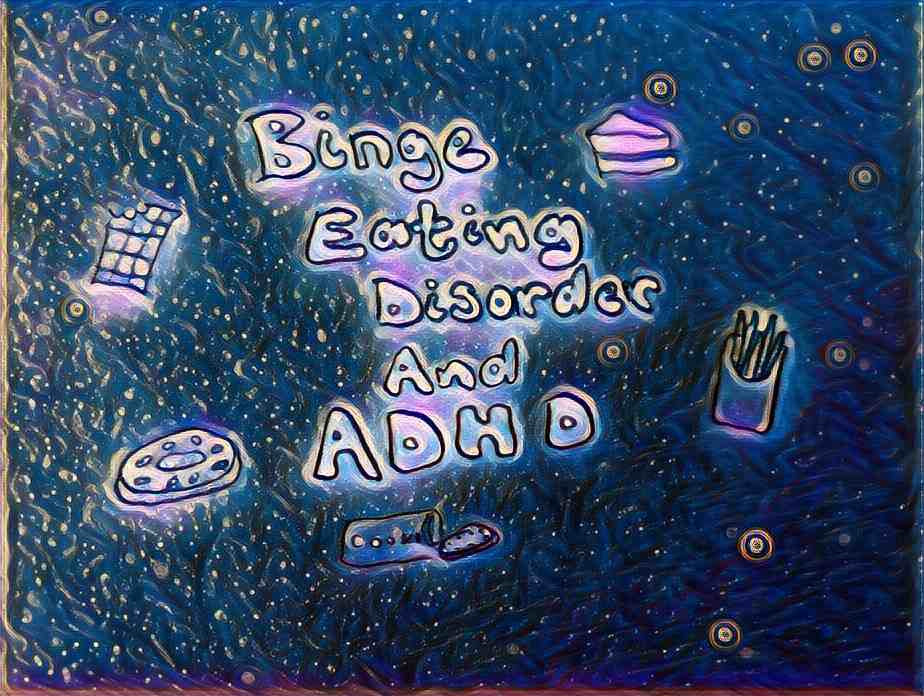Did you know that there is a relationship between ADHD and eating disorders? Studies have shown that people with ADHD are more likely to develop an eating disorder than those who do not have ADHD. There are several reasons for this, including impulsivity and difficulty regulating emotions. In this blog post, we will discuss the relationship between ADHD and eating disorders in more detail. We will also provide tips for how to deal with this issue if you or someone you know is struggling with it.
Contents
Defining ADHD
 ADHD is defined as a mental disorder that is characterized by problems with focus, hyperactivity, and impulsiveness. According to the American Psychiatric Association, ADHD can be diagnosed in children as young as six years old. Symptoms of ADHD include trouble paying attention, fidgeting, talking excessively, and being impulsive.
ADHD is defined as a mental disorder that is characterized by problems with focus, hyperactivity, and impulsiveness. According to the American Psychiatric Association, ADHD can be diagnosed in children as young as six years old. Symptoms of ADHD include trouble paying attention, fidgeting, talking excessively, and being impulsive.
There are three types of ADHD: predominantly inattentive type, predominantly hyperactive-impulsive type, and combined type. The most common type of ADHD is the combined type, which includes symptoms of both inattentiveness and hyperactivity-impulsivity.
Moreover, ADHD is believed to affect both males and females, though it is three to four times more common in males. And, also, with ADHD there are chances of developing other disorders such as oppositional defiant disorder, conduct disorder, and anxiety disorders.
Defining Eating Disorders
 Eating disorders are mental disorders that are characterized by abnormal or disturbed eating habits. These disorders can lead to severe weight loss or gain and can be life-threatening. There are three main types of eating disorders:
Eating disorders are mental disorders that are characterized by abnormal or disturbed eating habits. These disorders can lead to severe weight loss or gain and can be life-threatening. There are three main types of eating disorders:
- anorexia nervosa,
- bulimia nervosa, and
- binge-eating disorder.
Anorexia nervosa is a disorder in which a person restricts their food intake and often becomes severely underweight. Bulimia nervosa is a disorder in which a person binge eats and then tries to compensate for the calories consumed by purging through vomiting or excessive exercise. Binge-eating disorder is a disorder in which a person consumes large amounts of food in short periods of time. Often to the point of discomfort or distress.
These eating disorders are believed to have a link with ADHD as both conditions share similar symptoms. For example, both conditions are associated with impulsivity, which can lead to binge eating or restrictive dieting. So, it is important to be aware of the signs and symptoms of both conditions in order to get the proper treatment.
Symptoms of ADHD And Eating Disorders
There are a few key symptoms that are common to both ADHD and eating disorders. These include impulsivity, hyperactivity, and difficulty concentrating. More often, here are some of the key signs of ADHD and eating disorders to look for:
- A preoccupation with food, weight, and body image
- Intense fear of gaining weight
- Extreme dietary restrictions
- Skipping meals or binge eating
- Engaging in purging behaviors, such as vomiting or using laxatives, to control weight
- Missing work or school due to disordered eating behaviors
- Eating in secret or hiding food
- Withdrawal from friends and activities
- Mood swings or irritability
- Anxiety or depression.
These are some of the signs and symptoms of both ADHD and eating disorders. If you or someone you know is displaying these behaviors, it’s important to seek professional help. Eating disorders are serious mental illnesses that can have devastating effects on a person’s health, both physically and mentally.
However, with proper treatment people with eating disorders can recover and lead healthy lives.
How Does ADHD Affect Eating Habits?
 Eating habits are generally established in childhood and can be difficult to change in adulthood. For individuals with ADHD, poor eating habits can contribute to weight gain, low energy levels, and difficulty concentrating. A healthy diet is especially important for people with ADHD because it can help to improve symptoms and manage weight.
Eating habits are generally established in childhood and can be difficult to change in adulthood. For individuals with ADHD, poor eating habits can contribute to weight gain, low energy levels, and difficulty concentrating. A healthy diet is especially important for people with ADHD because it can help to improve symptoms and manage weight.
Moreover, changes in eating habits led to eating disorder development in some cases of people with ADHD. In fact, it is believed that there is a strong relationship between ADHD and eating disorders. One study found that nearly half of people with anorexia nervosa also had ADHD.
Link Between ADHD and Eating Disorders
It is believed that the link between ADHD and eating disorders is due to impulsivity. People with ADHD are more likely to make impulsive decisions, including decisions about food. This can lead to overeating or undereating. People with ADHD may also have trouble following a meal plan or sticking to healthy eating habits.
The relationship between ADHD and eating disorders is complex. Also, there are several theories about why the two conditions may be linked. It is possible that individuals with ADHD are more likely to develop poor eating habits, which can lead to an eating disorder.
Alternatively, the impulsivity associated with ADHD may lead to disordered eating. People with ADHD may make impulsive decisions about food, leading to overeating or undereating.
Finally, it is also possible that the two conditions share a common cause. For example, genetics or brain abnormalities may increase the risk of both ADHD and eating disorders. In fact, research suggests that there may be a genetic link between the two conditions.
If you have ADHD and are struggling with your eating habits, it is important to seek professional help. A therapist can help you develop healthy eating habits and manage your symptoms.
Causes And Risk Factors
 There are a variety of possible causes and risk factors for both ADHD and eating disorders. These include:
There are a variety of possible causes and risk factors for both ADHD and eating disorders. These include:
- Genetic disposition: ADHD and eating disorders often run in families, so there may be a genetic component to both conditions.
- Environmental factors: Exposure to trauma or stress, or having a parent with a mental illness, can increase the risk of developing either ADHD or an eating disorder.
- Neurochemical imbalances: Imbalances in the brain chemicals dopamine and serotonin are thought to play a role in both ADHD and eating disorders.
It’s important to remember that there is no single cause of either condition. And that multiple factors may contribute to the development of either disorder. Also, some of the risk factors include:
- being of normal weight or underweight
- poor interceptive awareness
- low self-esteem
- perfectionism
- impulsivity
- having perfectionist tendencies
These risk factors are not exclusive to either disorder and often overlap. This means that someone with ADHD may be at a higher risk of developing an eating disorder, and vice versa.
If you or someone you know is struggling with ADHD or an eating disorder, there is help available. Talk to your doctor or a mental health professional about treatment options.
Treatment Options For ADHD And Eating Disorders
 There are a few different treatment options available for people who suffer from both ADHD and an eating disorder. The common treatments are:
There are a few different treatment options available for people who suffer from both ADHD and an eating disorder. The common treatments are:
Medication
There are a few different types of medication that can be prescribed in order to treat ADHD. The most common type is stimulant medication, which can help to increase focus and concentration. Moreover, there are other types of medications as well, these include:
- non-stimulants,
- antidepressants, and
- antipsychotics.
Medications are often used in combination with other types of treatment, such as therapy. Also, it is important to discuss any possible side effects of medication with a doctor before starting a new prescription.
Therapy
There are many different types of therapy that can be effective in treating ADHD and eating disorders. The most common type of therapy is cognitive-behavioral therapy. This CBT works to help patients identify and change negative thoughts and behaviors.
For example, a therapist may help a person with an eating disorder to recognize their triggers for binge eating. And then develop coping mechanisms to deal with those triggers. They can help to change harmful thinking and behavior patterns.
Other types of therapy include:
- family-based therapy,
- interpersonal therapy,
- psychodynamic therapy, and
- group therapy.
The type of therapy that will be most effective depends on the individual. So, it is important to work with a therapist to figure out what will work best for you.
Support Groups
Support groups are generally a helpful way to meet people with similar disorders and share information, resources, and encouragement. Many people find that being part of a group is essential to their recovery.
Some groups are very specific (e.g., anorexia nervosa, bulimia nervosa). While others are more general (e.g., for all eating disorders). It is essential to find a group that is comfortable for you.
There are also many online support groups available. These can be helpful if there are no face-to-face groups available, or if you prefer to remain anonymous.
If you think you might benefit from attending a support group, talk to your doctor or therapist. They may be able to help you find a group in your area. You can also search online for eating disorder support groups near you.
Self-Care Tips
 When it comes to self-care, it is important to be mindful of your triggers and what sets off your symptoms. For some people with ADHD, managing their time and setting priorities can be difficult. This can lead to feeling overwhelmed and stressed, which can trigger disordered eating behaviors.
When it comes to self-care, it is important to be mindful of your triggers and what sets off your symptoms. For some people with ADHD, managing their time and setting priorities can be difficult. This can lead to feeling overwhelmed and stressed, which can trigger disordered eating behaviors.
Here are some of the things that you can do to manage your ADHD and take care of yourself:
- Get organized: Make a list of the things that you need to do and prioritize them. Break down big tasks into smaller, more manageable steps.
- Set a routine: Having a set routine can help you to stay on track and avoid feeling overwhelmed.
- Take breaks: Don’t try to do everything at once. Take breaks throughout the day to rest and recharge.
- Eat healthily: Eating a nutritious diet can help to improve your focus and energy levels.
- Exercise: Exercise can help to improve your symptoms of ADHD and reduce stress.
- Talk to someone: If you’re feeling overwhelmed, talk to a friend or family member. You can also reach out to a mental health professional for help.
By following these tips, you can start to take care of yourself and manage your ADHD. Creating a self-care plan that works for you can make a big difference in your symptoms and overall well-being.
Conclusion
To conclude, ADHD and eating disorders are two very different conditions. However, they can both have a negative impact on an individual’s life. If you or someone you know is struggling with either condition, it is important to seek professional help. With proper treatment, both conditions can be managed and individuals can lead happy and successful lives.
For more information, please contact MantraCare. ADHD is a neurodevelopmental disorder characterized by difficulty in paying attention, hyperactivity, and impulsivity. If you have any queries regarding Online ADHD Counseling experienced therapists at MantraCare can help: Book a trial ADHD therapy session


